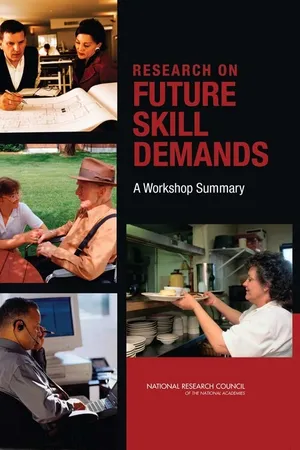
- English
- ePUB (mobile friendly)
- Available on iOS & Android
About this book
Over the past five years, business and education groups have issued a series of reports indicating that the skill demands of work are rising, due to rapid technological change and increasing global competition. Researchers have begun to study changing workplace skill demands. Some economists have found that technological change is "e;skill-biased, "e; increasing demand for highly skilled workers and contributing to the growing gap in wages between college-educated workers and those with less education. However, other studies of workplace skill demands have reached different conclusions. These differences result partly from differences in disciplinary perspective, research methods, and datasets.The findings of all of these strands of research on changing skill demands are limited by available methods and data sources. Because case study research focuses on individual work sites or occupations, its results may not be representative of larger industry or national trends. At a more basic level, there is some disagreement in the literature about how to define "e;skill"e;. In part because of such disagreements, researchers have used a variety of measures of skill, making it difficult to compare findings from different studies or to accumulate knowledge of skill trends over time.In the context of this increasing discussion, the National Research Council held a workshop to explore the available research evidence related to two important guiding questions: What are the strengths and weaknesses of different research methods and data sources for providing insights about current and future changes in skill demands? What support does the available evidence (given the strengths and weaknesses of the methods and data sources) provide for the proposition that the skills required for the 21st century workplace will be meaningfully different from earlier eras and will require corresponding changes in educational preparation?
Frequently asked questions
- Essential is ideal for learners and professionals who enjoy exploring a wide range of subjects. Access the Essential Library with 800,000+ trusted titles and best-sellers across business, personal growth, and the humanities. Includes unlimited reading time and Standard Read Aloud voice.
- Complete: Perfect for advanced learners and researchers needing full, unrestricted access. Unlock 1.4M+ books across hundreds of subjects, including academic and specialized titles. The Complete Plan also includes advanced features like Premium Read Aloud and Research Assistant.
Please note we cannot support devices running on iOS 13 and Android 7 or earlier. Learn more about using the app.
Information
Table of contents
- COVER PAGE
- THE NATIONAL ACADEMIES
- PLANNING COMMITTEE ON RESEARCH EVIDENCE RELATED TO FUTURE SKILL DEMANDS
- Preface
- Acknowledgments
- Contents
- 1 Framing the Research on Future Skills
- 2 Labor Market Trends: A Loss of Middle-Class Jobs?
- 3 Skill Demands of Knowledge Work
- 4 Skill Demands of Service Work
- 5 Promising New Data and Research Methods
- 6 Skill Supply and Demand
- 7 Implications for Education and Training
- 8 Final Reflections
- References
- Appendix A Workshop Agenda
- Appendix B Professional and Service Occupational Clusters
- Appendix C Biographical Sketches of Planning Committee Members and Staff